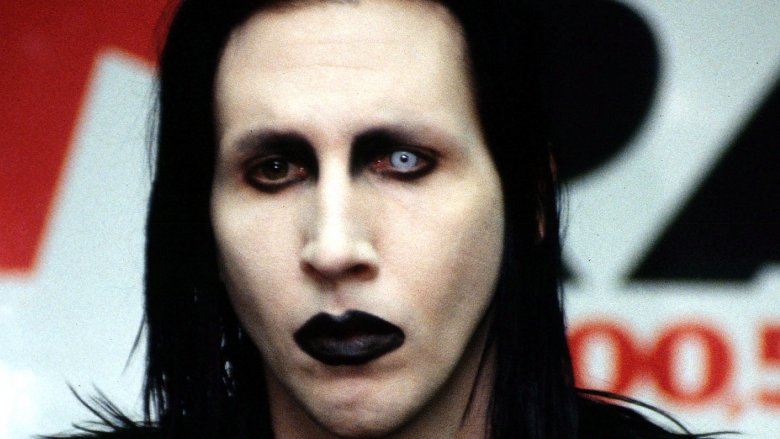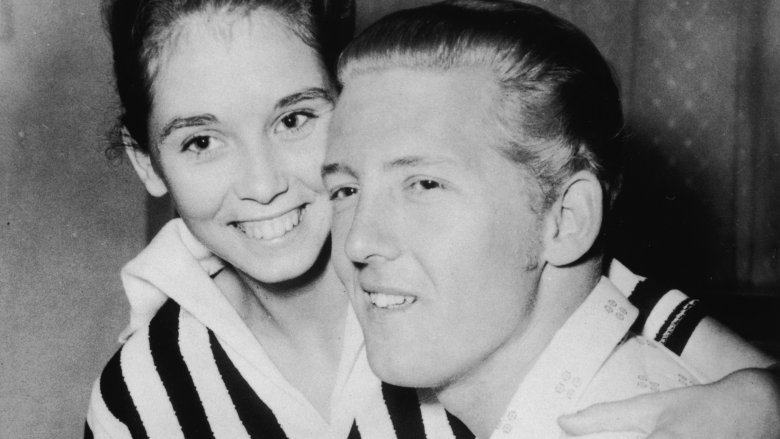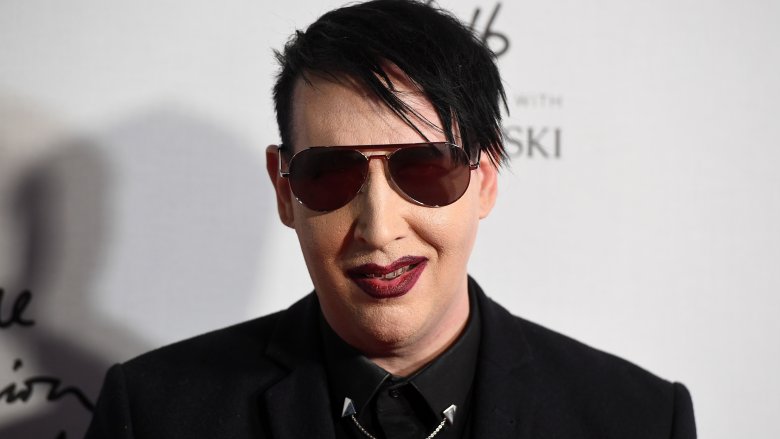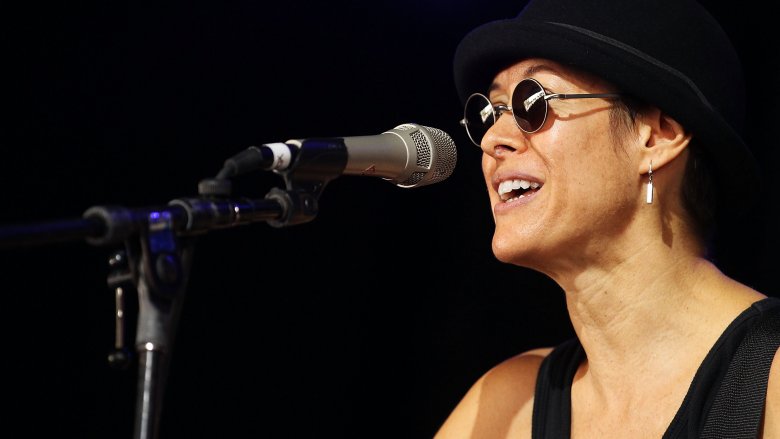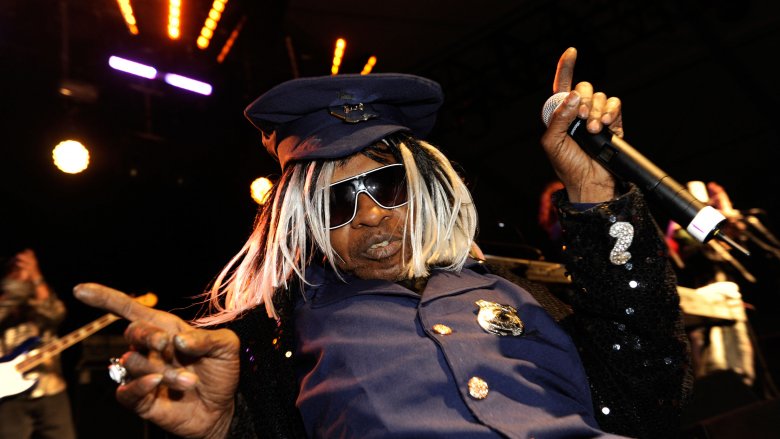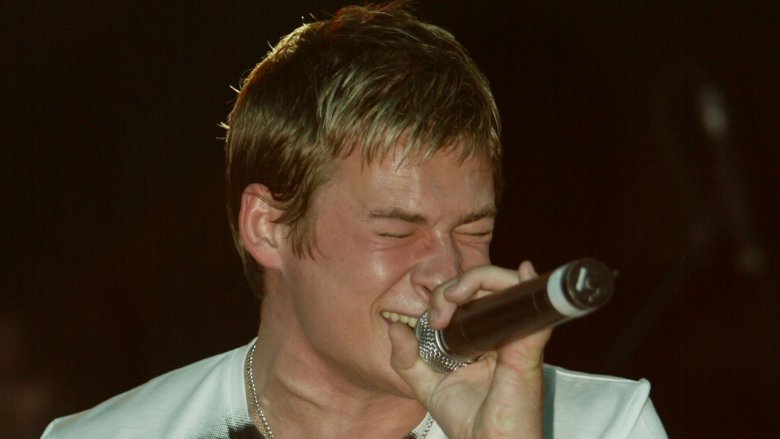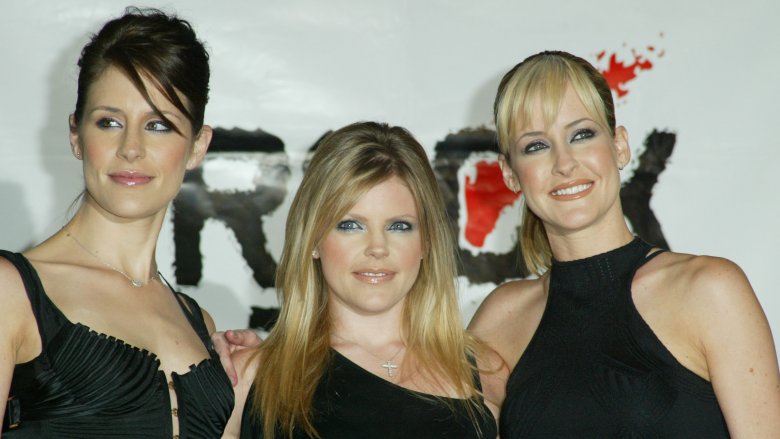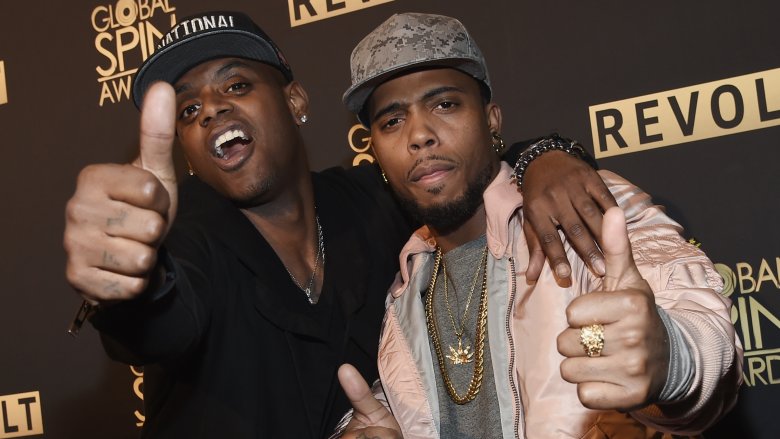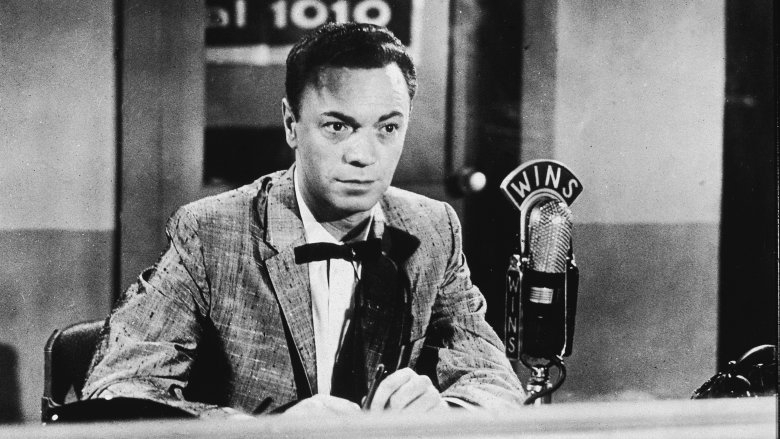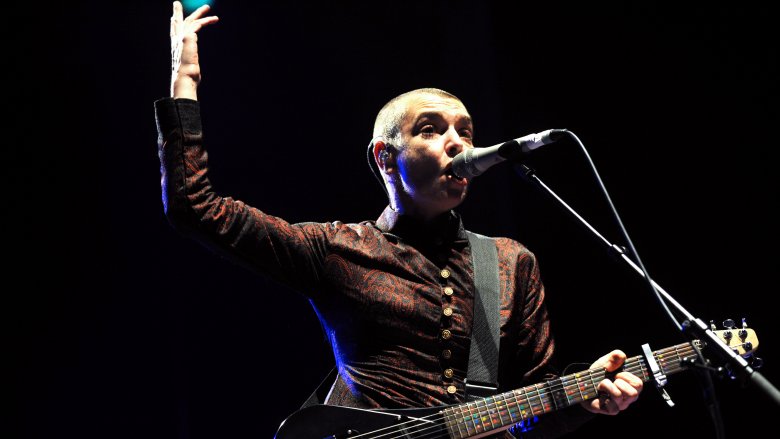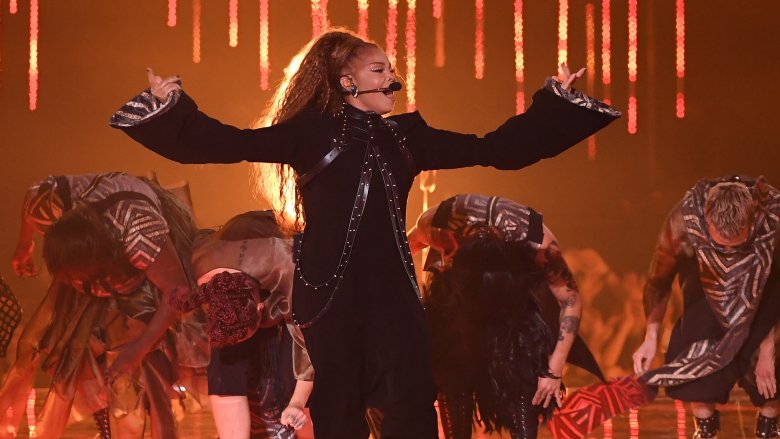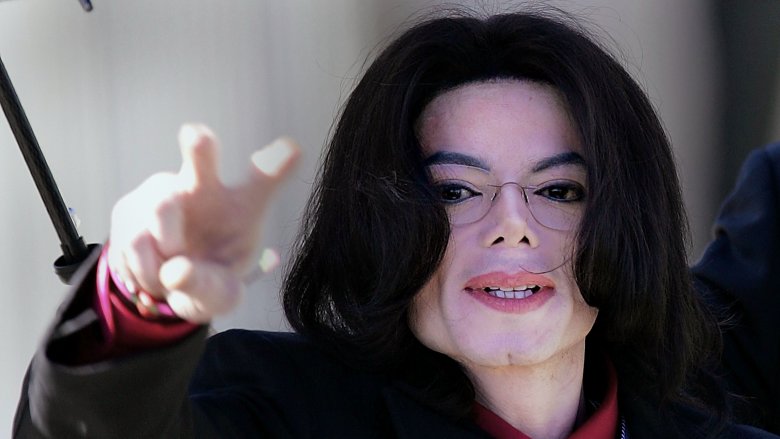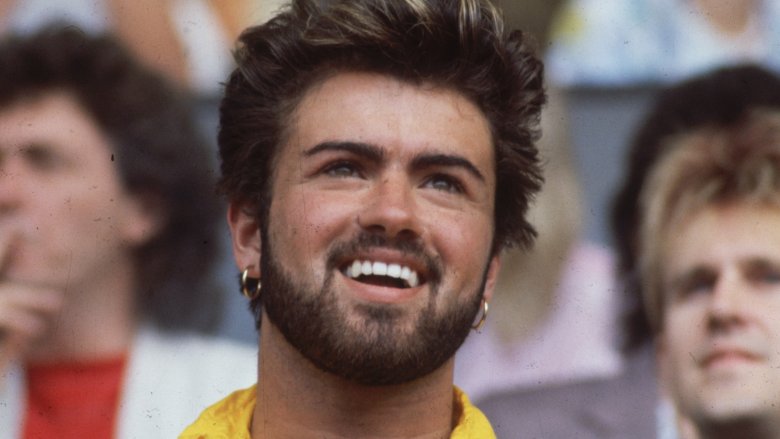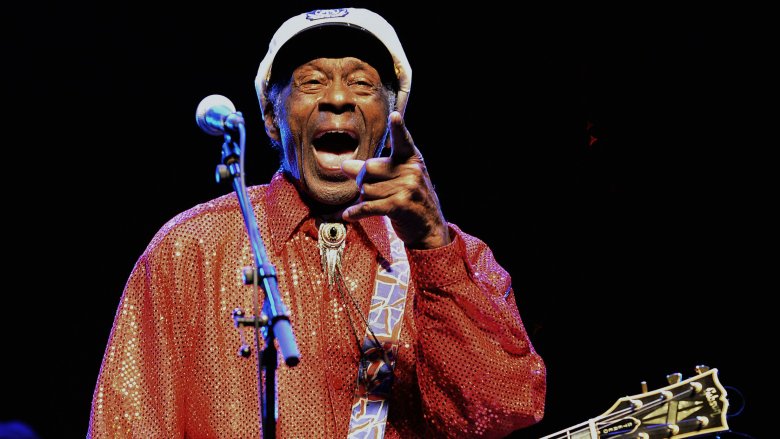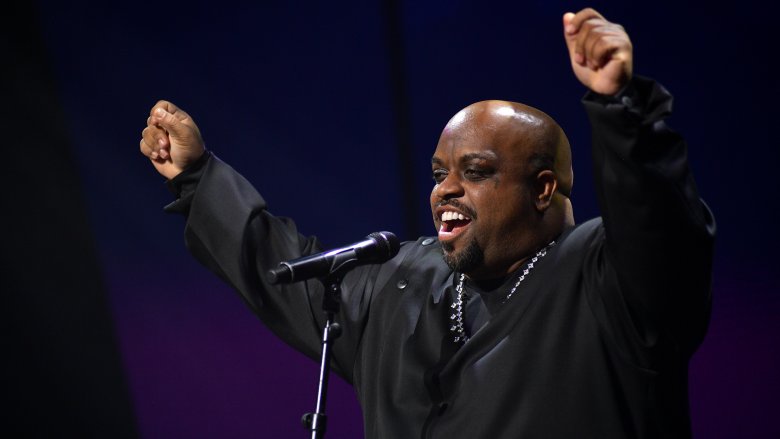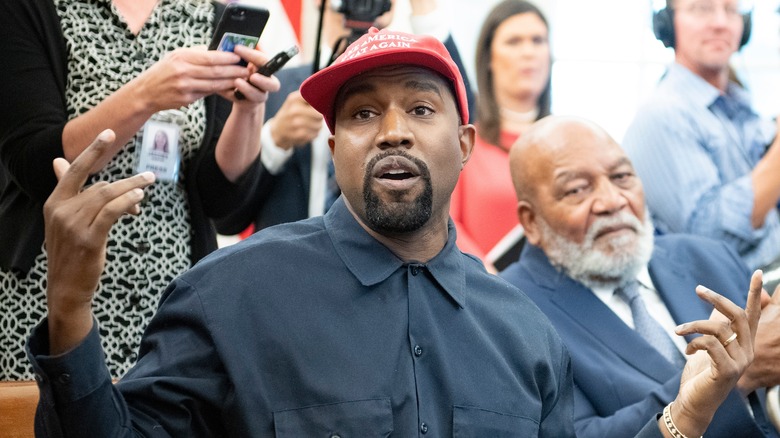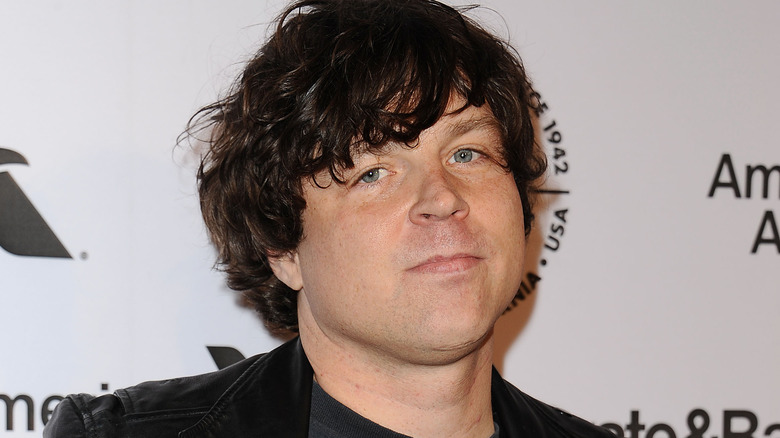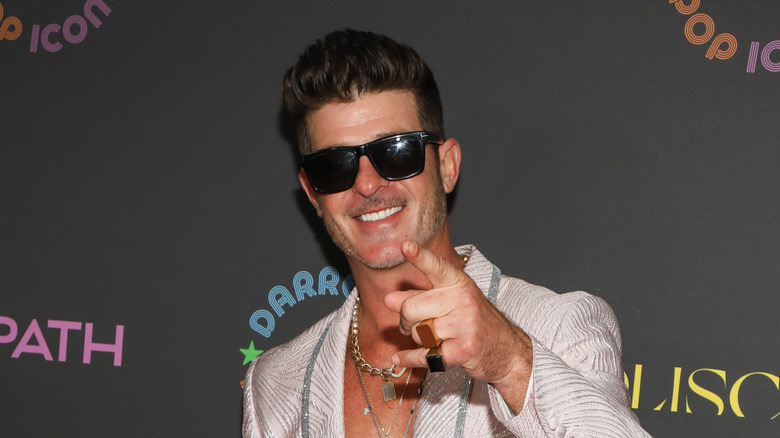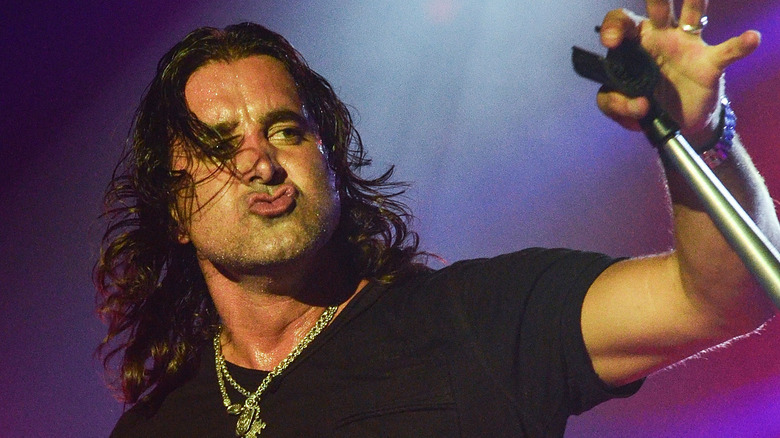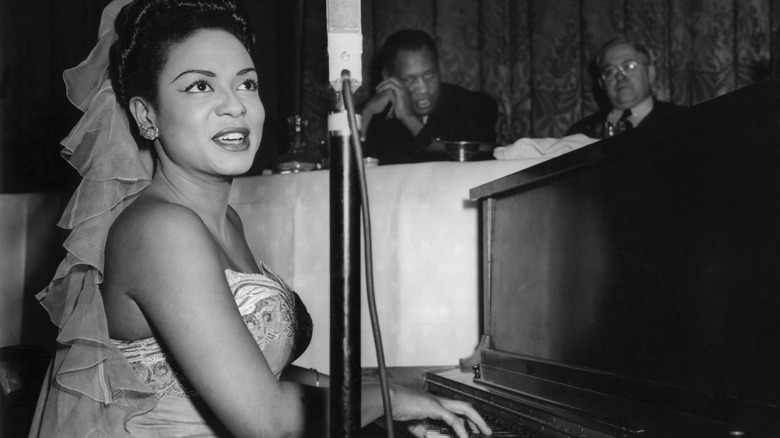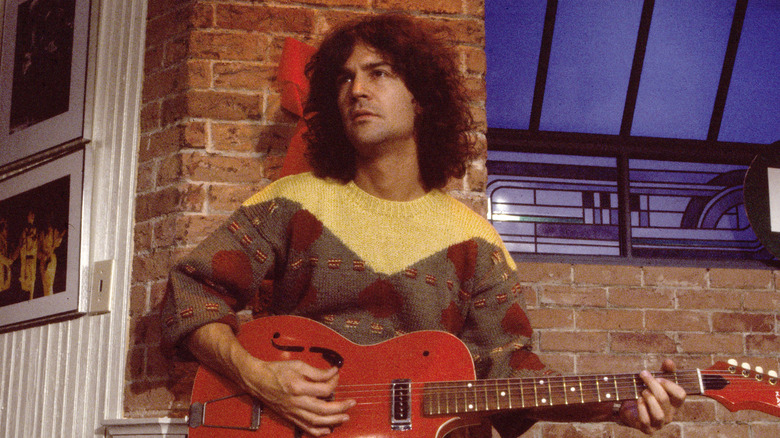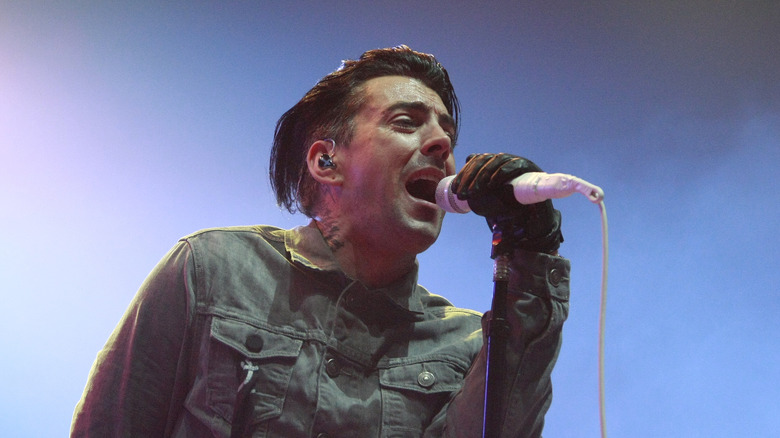The One Moment That Destroyed These Musicians' Careers
It sometimes feels like musicians can get away with anything. Justin Bieber can get arrested and still keep cranking out mediocre music. Ozzy Osbourne can bite the head off a bat and still land a mediocre reality show. Johnny Cash can publicly confess to shooting a man in Reno, just to watch him die, and still get to cut a record in Folsom Prison. Man, what would a musician have to do to get in some real trouble?
Depending on the musician in question, maybe not so much. While some can get away with near-murder, other crooners find themselves looking down the barrel of a ruined career just for having the wrong backup dancers. If you're struggling with a hyper-successful music career and need to take the pressure off, take note. Any one of these could have you on food stamps faster than you can say "career suicide."
Jerry Lee Lewis introduces Britain to his child bride
Britain might be a strange sort of place, what with its endless cups of tea and citizens' insistence on talking about the weather like it's an actual topic of worthwhile conversation, but there's "strange to American eyes" and then there's "so strange they're totally down with the idea of incestuous child brides." In 1958, rock 'n' roll icon Jerry Lee Lewis accidentally mistook the former for the latter and decided to take his underage wife with him on his tour of England. As History Channel details, career-destroying chaos ensued.
The Killer had neglected to tell anyone he was newly married, so when he rocked up with Myra Gail Lewis (pictured) in tow, the British press were naturally curious. A Daily Mail reporter, Paul Tanfield, happened to ask how old the newlywed was. Lewis said she was 15. His transatlantic career was over.
The truly shocking part is that Lewis was lying. Myra was actually 13. Worse, she was actually Lewis' cousin. Let that sink in. Jerry Lee Lewis flew to Britain with the barely teenage blood relative he was (presumably) having massively illegal sex with and didn't think this would somehow come back to bite him. Bite him it did. His British tour collapsed. Those that showed at his gigs went only to boo him. Concerts were canceled. His expensive hotel kicked him out. When he finally high-tailed it back home to the States, he found he'd been blacklisted. The radio would no longer play his songs, he was dropped from TV appearances, and demand for his performances all but disappeared, though he never lost his recording contract and continued to release (mostly unsuccessful) singles.
Eric Clapton goes on a drunken anti-immigrant tirade
British guitarist Eric Clapton is the only person to have been inducted into the Rock & Roll Hall of Fame three separate times. He's also the only musician to have sparked an anti-racism movement in direct response to a speech he made. Rock Against Racism was a major music movement in Britain in the 1970s and 1980s. The BBC has described it as a "turning point in British culture." It was the forefather of the Love Music Hate Racism movement that you'll find at most modern British festivals. And it only exists because Clapton once acted like a drunken Archie Bunker.
The year was 1976. Race relations were at an all-time low in Britain. The far-right National Front was attracting millions to its marches. Asian teenagers were being murdered in the streets. Even David Bowie was expressing admiration for fascism (admittedly while also doing all the cocaine). At the height of all this, a drunk Eric Clapton clambered onto stage in Birmingham and yelled "Enoch was right ... we should send them all back" (via The Guardian).
The rest of Clapton's speech reads like a Dummy's Guide to inflaming racial tensions. The guitarist said Britain was becoming a "black colony" and his audience should vote the controversial politician Enoch Powell (like a British George Wallace) to "keep Britain white."
While Clapton's outburst didn't see him totally ostracized, it did permanently stain his career in his native country. Forty years later, his name is still synonymous with racism.
Marilyn Manson gets blamed for the Columbine massacre
On April 20, 1999, two kids named Eric Harris and Dylan Klebold walked into their Columbine high school and started shooting. They kept shooting until 13 people were dead and over 20 injured. In the aftermath of the tragedy, America started casting around for someone to blame. Enter Marilyn Manson.
At the time, Manson was already seen by Middle America as the antichrist. When word got out that Harris and Klebold had listened to his music and were goths, the nation's moms and pops went nuts. In an interview with The Guardian, Manson later said the massacre destroyed his "entire career." His concerts were protested. He received hundreds of death threats. Bomb threats were called in to his gigs. The most aggravating part? As Manson later wrote in an article for Rolling Stone, Harris and Klebold weren't goths. They weren't even fans of Manson's music. They were into KMFDM and Rammstein.
Manson would later tell NME (recounted here via CNN) that "when it comes to things like Columbine, it would have been different if [Harris and Klebold] had actually liked my music, but I think that I have had more blame accredited to me than any person in the history of music," although, to be fair, he qualified this thoughtful take with the claim "there should be some sort of Grammy for that." What's that old adage about there being no such thing as bad publicity?
Michelle Shocked tells San Francisco that God hates LGBT people
For someone who once told Dallas Voice that she'd "be honored" to be called an honorary lesbian, Michelle Shocked sure seems to have a strange grasp of what "honored" means. In 2013, the famously leftie country singer dropped an H-bomb's worth of LGBT slurs while playing a club in, of all places, San Francisco. According to The Guardian, Shocked took time out from her set to yell on stage, "When they stop Prop 8 and force priests at gunpoint to marry gays, it will be the downfall of civilization, and Jesus will come back," before adding, "You are going to leave here and tell people, 'Michelle Shocked said God hates f—-ts.'"
Shocked is a one-time big artist who once shared a stage with Madonna and Sinead O'Connor. After suing her record label under the 13th Amendment (which bans slavery), Shocked dropped out of the big time and started self-releasing, relying on her hardcore fanbase to make ends meet. Her hardcore fanbase who just happened to be largely made up of liberals and lesbians. Whoops.
The LGBT-slur controversy left Shocked at the center of a media storm and on the wrong side of her own fans. In a long interview piece with the singer, Dallas Morning News claimed in 2017 that the outburst sent Shocked's career into a near-terminal nosedive, losing her bookings and wiping out a planned tour. For her part, Shocked says her comments were misunderstood and weren't meant literally. So that'd make them ... figuratively homophobic?
Sly Stone gets busted for cocaine possession
The collapse of Sly Stone's career was less a single moment than a whole series of increasingly desperate moments that finally culminated in one uber-moment that effectively ruined his reputation forever. Having ended the '60s playing Woodstock as the head of pioneering funk outfit Sly and the Family Stone, he segued into the '70s stuffing enough cocaine up his nose to get a whole galaxy of Scarfaces high.
The singer started missing concerts and collapsing on stage. In 1976, his pet dog mauled his son. His wife left him. His band broke up. Still, Sly could have probably recovered from all this. Failed marriages, band breakups, and drug addiction are part of the job description for troubled musicians. But there's one thing record labels in the '80s still took a much dimmer view on. In 1983, Stone was busted for cocaine possession. As People detailed in a 1996 profile, he didn't work again for over a decade.
Amazingly, getting caught with quantities of cocaine big enough to be measured in Escobars wasn't the only ruinous moment of Stone's career. After starting to work again in the 2000s, he was invited to play Coachella in 2010. It was meant to be his comeback. Instead, Sly rocked up late dressed in a blonde wig (pictured), rambled incoherently, played some stuff off his iPod, and then gave up. Only a year later, the former funkmaster was homeless and living in a van.
Lee Ryan responds to 9/11 by insisting people talk about elephants
If you were alive in October 2001, there was only one topic of conversation on your lips. A month before, terrorists had smashed planes into the Twin Towers, killing 3,000. A wounded America was still trying to understand what had happened, while the rest of the world was still looking on in sympathy. With one exception. Lee Ryan of the British boyband Blue was not impressed with all this grief and solidarity. In an interview with The Sun on October 26 (via NME), Ryan asked, "Who gives a f*** about New York when elephants are being killed?"
The Sun quoted Ryan as then going on to say, "They are ignoring animals that are more important. Animals need saving and that's more important. This New York thing is being blown out of all proportion." The only way Ryan could have possibly dug his already-deep hole any deeper would be if he'd then ended the interview by lynching a bald eagle with a burning American flag.
To be fair, Ryan was 17 when he gave this interview, and asking for insightful comments from hormonal teenagers might be a bit much. On the other hand ... there isn't really another hand. The dude responded to the worst terrorist massacre in history by saying elephants were the real victims. Not even Gary Busey brings that much crazy to the table. Fittingly for those that believe in karma, Ryan and the rest of Blue split a couple years later and all eventually went bankrupt.
The Dixie Chicks say they're ashamed the president is from Texas
Country music and patriotism go together like country music and bourbon, or country music and tragic breakups. Lovin' the stars and stripes is so integral to the heart of the country scene that it'd take a very brave or very stupid performer to say something flagrantly unpatriotic while riding high in the Billboard country charts. The Dixie Chicks are those performers.
In 2003, at a time when Congress had literally changed the name of french fries to freedom fries in a show of patriotic fervor, the Chicks took to a stage in London and gave their thoughts on the upcoming Iraq War. Lead singer Natalie Maines declared to the crowd, "Just so you know, we're on the good side with y'all. We do not want this war, this violence, and we're ashamed that the president of the United States is from Texas." As The Guardian detailed, that was the exact moment the Chicks' career hit the red, white, and blue fan.
Country music dropped the all-girl outfit like radioactive waste. Their singles plummeted down the Billboard charts before vanishing entirely. Radio stations banned their music. They received so many death threats that they claimed they were forced to install metal detectors at their concerts. Ex-fans held parties where they destroyed their old Dixie Chicks CDs. Their sales never recovered.
As late as 2015, The Guardian was still rhetorically asking if country music would ever forgive the Chicks. In 2020, the group returned to the spotlight, renamed as simply The Chicks, with their first album in 14 years.
Rapper B.o.B claims the Earth is flat
Retro is big business. The 2010s have seen fashion take us back to the 1990s. The 2000s took us back to the 1980s. In January 2016, hip-hop artist B.o.B decided to top all that by taking geography back to the Stone Age. In an unbelievable-before-2016 tweetstorm, B.o.B fired off endless pictures, thoughts, and "facts" all designed to prove one thing and one thing only: that the globe you had in elementary school lied to you and that the Earth is flatter than a bottle of old Pepsi. The Guardian has details, if you can stomach them.
The series of tweets has since come to define what's left of B.o.B's career. While the artist suffered only reputational damage from having the entire internet laugh at him, his subsequent Twitter spats with guys like astrophysicist Neil deGrasse Tyson have sent him careening off down a rabbit hole that has since consumed his entire life. In September 2017, B.o.B even launched a GoFundMe campaign to raise $1 million to launch satellites into space for "finding the curve," an impressively obtuse way of saying "for proving the Earth is flat" (via Verge). The campaign was later suspended, but not before institutions and people as respected as Buzz Aldrin, National Geographic, and NASA had taken time out from their busy schedules to troll the one musician on Earth who apparently missed the Age of Exploration.
Alan Freed broadcasts a black man dancing with a white woman
DJ and songwriter Alan Freed's name is obscure today, but he left behind one heck of a legacy. He's credited with being the guy who coined the term "rock and roll." He threw the world's first rock concert. (The BBC has the full, fascinating story.) The guy was at least as instrumental as determining the course of postwar American music as Marty McFly. Between 1952 and 1957, he was the kingmaker of rock 'n' roll.
Which begs the question, what happened in 1957? At the time, Freed had a nationally syndicated ABC show, Big Beat, bringing his newfangled rock and/or roll to the entire country. One evening, something so unbelievably and unremittingly anti-American happened that the network had no choice but to immediately pull the plug. Big Beat showed a black performer dancing onstage with a white woman. Gasp!
It sounds ridiculous to 21st-century ears, but that one interracial dance was enough to get Freed's show canceled. As the LA Times detailed, it couldn't have come at a worse time for Freed. His marriage was falling apart and his health collapsing. Two years later, the final blow came. While still on the ropes from his The Big Beat controversy, Freed was investigated by the FBI for accepting cash to play records as part of the payola scandal. What was left of his career was over. He died in 1965 a penniless alcoholic. The good ol' days, huh?
Ashlee Simpson was outed as a lip syncer
We've all had those nightmares, the ones where we're standing in front of an audience and we open our mouths and nothing but a duck quack comes out. Or we look down and we're naked. Or we're suddenly Ashlee Simpson on "Saturday Night Live."
The moment that was probably responsible for the fact that Ashlee Simpson faded away during the late 2000s was that moment during her SNL performance when she realized her band was playing the same song she had sung earlier in the show, and oops, here come the pre-recorded vocals. Now, Simpson is not the first artist to lip sync a performance, but lip syncing is almost universally despised by fans, and Simpson was not forgiven for her mistake. According to People, she was relentlessly hounded by critics and former fans not for the weird little dance she did while the band continued to play the wrong song but for the fact that she'd actually dared to engage in deception via lip syncing. And when she tried to explain that a severe case of acid reflux had prompted her decision to fake the performance, that sort of just made everyone hate her even more.
Even today, Simpson hasn't truly shaken off the experience. The two albums that followed her fateful SNL performance undersold the one she'd been promoting at the time, and she never had another top 10 song.
Sinead O'Connor pissed off every Catholic in America on live TV
Ashlee Simpson can take comfort in knowing that she's not the only musician who has ever derailed her own career on "Saturday Night Live." In fact SNL-related career derailment was pioneered in 1992 by Sinead O'Connor when she sang Bob Marley's "War" and then ended her performance by ripping up a photograph of the Pope.
It's unclear what she thought was going to happen, but generally speaking, there are some lines you just don't cross. You don't kill puppies, for example. You don't stand on a chair at a country music festival and shout "death to America." And you don't rip up a picture of the pope on live television in a country where nearly 25% of the population is Catholic.
To be fair, she was protesting the sexual abuse of children in the Catholic church, which is a problem the general public is much more aware of today than it was in 1992. And back then most Americans were especially clueless about the issue because at that point it was mostly being brought to light in Ireland.
Anyway, according to Irish Central, O'Connor became so unpopular after that little faux pas that she was booed at Bob Dylan's 30th-anniversary concert just two weeks later. Not long after that, she announced her "retirement." She didn't stay retired, of course, but she was never able to quite recapture the success she'd once had.
You know exactly what happened to Janet Jackson, but Justin Timberlake has done fine
During the halftime show at Super Bowl XXXVIII in 2004, Justin Timberlake pulled down Janet Jackson's leather bustier and exposed her breast to a television audience of roughly 100 million people. Both artists later said the stunt had only been sort of intentional — Timberlake was supposed to reveal the red lace under Jackon's bustier, but he ended up tearing off the whole thing.
Then the American viewing audience, Viacom, and the FCC proceed to lose their collective minds. Around 540,000 people complained to the FCC, and the FCC responded by attempting (and failing) to fine CBS $550,000 for the incident, which E Online says lasted roughly 9/16 of a second. But the person who suffered most was Jackson. Viacom, which owns MTV, CBS, VH1, and a bunch of radio stations wanted revenge, so they banned her music from all their properties. And then a bunch of other media companies did the same thing, and pretty soon no one anywhere was playing Janet Jackson songs anymore. And just in case she didn't get the message, she was also uninvited from the Grammys.
It's worth noting that Timberlake was not uninvited from the Grammys and he was also not banned from MTV or Viacom, either, even though he was the guy who actually did the deed. But surely misogyny had absolutely nothing to do with which artist ended up with a ruined career.
Milli Vanilli's backing track skipped during a live MTV performance
The Monkees got a lot of shade for being a "manufactured band," but they survived for decades because they never lied about what they were. History doesn't remember the '90s pop group Milli Vanilli quite so kindly because Milli Vanilli was all lies.
Front men Rob Pilatus and Fab Morvan had basically just lip synced their way to fame and fortune, and it wasn't Ashlee Simpson-style "I have acid reflux" lip syncing, either. Pilatus and Morvan didn't even do their own singing in the studio — their voices were 100 percent other singers, singers Huffington Post says had to be sworn to secrecy.
So how did Pilatus and Morvan end up as the faces of Milli Vanilli when other people were doing all the singing? According to Gizmodo, producer Frank Farian thought the real singers were "unmarketable," so he hired a couple models to pretend they were the ones singing. What he didn't seem to comprehend was that you can't keep a lie that size quiet forever, especially not when it got you a Grammy.
In 1989, Milli Vanilli was doing a live performance on MTV when the backing track skipped, and that's what clued in the media, who did some further digging and discovered that Pilatus and Morvan actually did none of the singing. Milli Vanilli lost their Grammy and that was pretty much the end of that.
Police saw that one Michael Jackson documentary
Michael Jackson's 2005 trial was the media circus of the century. Jackson was accused of sexually molesting Gavin Arvizo, who was 15 years old at the time. He was acquitted, but since then no one has really been able to agree on whether he was actually a child molester or just a seriously weird dude who liked to have sleepovers with kids.
Still, even if Jackson were the latter, there's no doubt he made some really stupid and arrogant choices. One of them was the fact that he regularly allowed young boys to sleep in his bedroom and pretended like there wasn't anything weird about it. And he even said as much in the 2003 documentary "Living with Michael Jackson," which was probably the moment that led to his downfall.
According to People, police saw the film, opened an investigation, raided Jackson's Neverland Ranch, and the circus began. It didn't matter that he was acquitted because most people had already made up their minds.
In the years following the trial, Jackson developed a dangerous prescription drug addiction. His dependence on the anesthetic propofol deprived his body of real sleep and gave him severe symptoms of sleep deprivation, which included an inability to remember lyrics or learn new dance moves. His career stagnated and his debts continued to mount. Ultimately, it was propofol that killed him in 2009. The eye-opening new documentary "Leaving Neverland" seems on track to kill any positive legacy that might have remained.
George Michael was doing weird stuff in a public bathroom
Fame does weird things to people. Like make them think it's okay to have slumber parties with 12-year-old boys and engage in "lewd acts" in public restrooms. Because being famous means you're invisible to other humans in real life. Or something. We all know who did the slumber-party thing, and the public restroom thing probably also rings a bell — that was pop singer George Michael, who was famous in the '80s for being a sex symbol and for having that weird 5 o'clock shadow thing that seemed unresponsive to normal shaving.
In 1998, Michael was arrested for "engaging in a lewd act" in a public restroom. You've gotta admire the dude, though, because after that all went down he didn't just crawl into a hole and hide — he considered it his moment. According to the Telegraph, the once-reclusive Michael was suddenly agreeing to interviews, and by the end of the scandal he'd gone from a closeted pop star to an out-and-proud gay pop star, although he had technically already come out, just no one had noticed. Friends and family found out years before the bathroom incident, and he'd been alluding to it in song lyrics for just as long.
Michael's career never really recovered, though — at least not in America, where there's still way too much homophobia. But today Michael is remembered for publicly embracing his sexuality and helping young gay people feel like they could do the same.
Chuck Berry's house was raided after he secretly taped women in public restrooms
The good news for Chuck Berry is that he was already a superstar when the whole bathroom video tape thing came to light. The bad news is that no one can really talk about his legacy anymore without remembering the gross and unconscionable stuff he did in the late 1980s.
In 1990, police seized weapons, pornographic videotapes (some of which appeared to show underaged girls), marijuana and hashish, and $130,000 in cash from Berry's home. Not long after that, the New York Post says a bunch of women filed a class-action lawsuit against him alleging that he had video cameras hidden in the bathrooms of his house and a restaurant he owned — cameras that he would use to record women while they were dressing, undressing, or using the bathroom. So, eww.
Berry got off pretty lightly, though — he was charged with drug possession and child abuse, but the child abuse charges were dropped and he was sentenced to just two years of unsupervised probation, plus $5,000 paid to a drug rehabilitation program. That's nothing, but the incident also cost Berry $1.2 million in legal fees. Unlike some of the other folks on this list, his career wasn't ruined in the sense of blacklisting or a downward spiral of drug addiction and despair — in fact he kept on performing, but pretty much no one could go see him without feeling seriously icky about it.
CeeLo Green said it's not rape if she's unconscious
The good news for Ashlee Simpson is that career-ending faux pas can be so much worse than just lip syncing on SNL, and they can even be worse than lewd acts in a public restroom and, yes, videotaping women in bathrooms. In 2014 CeeLo Green proved that careers can end over heinous acts of violence, too, although that's evidently not always a given since Chris Brown's career is still pretty much a-okay just a few years after he was arrested for beating up Rihanna.
Anyway, CeeLo Green's career-defining moment was the one in which he took to Twitter to proclaim his innocence after he was accused of raping an unconscious woman. According to the Guardian, though, he didn't say something sensible, like, "I would never rape anyone, it was totally consensual." Nope, he said the stupidest thing he could come up with: "People who have really been raped REMEMBER." And then he also tweeted some nonsensical stuff about how you can't be "with" someone if you're unconscious so you know, it all made him look super guilty.
Somehow, Green managed to squirm his way out of the allegations and was convicted only of a lesser charge of supplying drugs because fame is powerful. He got three years' probation and community service. But his career never really recovered and the most notable thing he's done since was a performance during the opening ceremonies at the 2017 World Aquatics Championship in Budapest as well as some voice work on the children's animated series Teen Titans Go!. Hmmm.
Kanye West's antisemitic social media rant cost him dearly
There was a time when Kanye West — whose legal name is Ye — was hailed as a groundbreaking artist, thanks to a seemingly neverending string of massive hits and collaborations with everyone from Jay Z and Rihanna to Daft Punk and Jamie Foxx. In recent years, however, West has become better known for his outlandish antics and controversial statements than his music.
West's real-life story is tragic, but over time, more and more people have been distanced by his unpredictable behavior, from publicly wearing a "White Lives Matter" shirt to his controversial political views. For many, the last straw came on October 9, 2022, when West unleashed a torrent of antisemitic messages on X (formerly known as Twitter).
The incident was merely the latest in West's long line of similar behavior, and it was clear that he didn't expect backlash. "I can say antisemitic s*** and Adidas cannot drop me," he boasted on the podcast "Drink Champs" (via Forbes) before the tweets. As it turns out, he was wrong. Adidas, his most lucrative collaborator, ended up dropping West in the wake of the scandal, slashing around $900 million of his estimated net worth. Combine this with a number of other lost business partners, significant public outrage, and various labels and agencies disowning him, and it's clear that West's reputation has taken a quite possibly unrecoverable hit.
Ryan Adams exploited aspiring female muscians
It's easy to pinpoint the exact date Ryan Adams' career as a beloved, Grammy-nominated singer-songwriter ground to a halt. On February 13, 2019, The New York Times published a lengthy story that detailed multiple allegations against the celebrated artist, including descriptions of psychological and emotional abuse, and a pattern of using his fame and esteem as leverage to attract aspiring female musicians and not following through with his promises of help and collaboration. Per the article, one of Adams' alleged victims was underage. On July 3, 2020, Adams published a long apology letter in The Daily Mail, expressing his intentions to improve himself and seek help for his substance abuse issues, and admitting that his actions are unlikely to be fully forgiven.
"To a lot of people this will just seem like the same empty bulls*** apology that I've always used when I was called out, and all I can say is, this time it is different," he wrote. "Having truly realized the harm that I've caused, it wrecked me, and I'm still reeling from the ripples of devastating effects that my actions triggered. There is no way to convince people that this time is truly different, but this is the albatross that I deserve to carry with me as a result of my actions."
Adams has continued to make music after the sexual misconduct allegations, but his Billboard 200 days seem to be behind him.
Robin Thicke blurred lines a bit too hard
In 2013, Singer Robin Thicke scored a massive hit with the chart-topping "Blurred Lines," which went on to cause enough controversy to last a lifetime. British student unions started banning the song, and several media outlets called attention to its uncomfortable lyrics, which many felt landed on the wrong side of sexual consent. It didn't exactly help that the song became associated with a highly controversial MTV Video Music Awards performance, in which Thicke performed with Miley Cyrus ... and Cyrus later told The New York Times that Thicke had explicitly requested that she'd wear as little as possible.
While he has been able to pivot into a gig as a talent show panelist, Thicke hasn't come close to the heights of his earlier success with the music he's released after the "Blurred Lines" outcry. What's more, the song has become the opposite of a gift that keeps on giving for Thicke, since it resurfaces every once in a while to make things even more uncomfortable. In 2019, the song's co-writer Pharrell Williams told GQ that he came to dislike the song's lyrical content once he understood its full context. What's more, model Emily Ratajkowski — who starred in the "Blurred Lines" video — alleged in her book "My Body" that Thicke had groped her during the filming.
A bad concert experience caused fans to sue Creed
In 2003, four fans sued Creed because they felt a 2002 concert the band played near Chicago was bad. A judge dismissed the lawsuit in 2003, but Creed never recovered and broke up in 2004 after a long dormant period. There was bad blood before, but in a 2004 interview with MTV News (via Ultimate Classic Rock), singer Scott Stapp made clear that he considered the lawsuit to be a major factor in their implosion. "Basically the people who sued just wanted the press and attention and money," Stapp said. "Everybody didn't sue; it wasn't a class-action suit. I think what got [Creed guitarist Mark Tremonti] upset was that it was his hometown and two people in the newspapers were bashing his band."
The reason the fans filed the lawsuit was Stapp's allegedly visible intoxication during the show — a follow-up to several well-publicized issues the singer had faced throughout the year. Stapp has a history of addiction and mental health issues, which continued after Creed broke up and contributed to a breakdown in 2014. Fortunately, later years have found him in a more positive place. "When you start mixing alcohol and substances to self-medicate, that's a toxic combination," Stapp said in a 2019 interview on "Nightline." "That can create a human being that is so far removed from who you are, because of the chemicals inside of you, that you can say and do some pretty nasty things."
Hazel Scott was blacklisted for speaking out
Singer and jazz pianist Hazel Scott was not only a groundbreaking musical prodigy, she was one of the major celebrities of the 1940s and seemed to find success in all fronts of entertainment. Apart from her music career, she appeared in TV shows and movies. She even hosted her own short-lived "The Hazel Scott Show." Most impressively, she was a Black artist who was able to not just evade the unsavory attitudes of the era, but she actively fought against them, refusing to appear in projects that depicted Black people as racist stereotypes or play segregated venues.
Unfortunately, Scott's activism and willingness to stand up and challenge the powers that be was her career's undoing. She was falsely accused of communist sympathies, and when she voluntarily appeared before the House Un-American Activities Committee to defend herself, she was promptly blacklisted in 1950. This McCarthyism-era move was particularly hard on Scott, who suddenly had no way to stay in the public eye. Scott and her family dodged the hostility on the home front by moving to Paris, but while she continued both her artistry and her activism, her career never recovered.
Billy Squier made a bad music video
In the early 1980s, Billy Squier's songs were a fairly common sight on the charts. After 1984, things have been much slower for the man who could have been a major rock star. Squier didn't sink because his music suddenly couldn't cut it, or because of some terrifying skeleton in his closet. His fate was sealed by his single "Rock Me Tonite" ... or rather, its music video, which many professionals consider abysmal, Squier included. "When I saw the video, my jaw dropped," he said in the book "I Want My MTV" (via Onstage Magazine). "It was diabolical. I looked at it and went, 'What the **** is this?'"
For rock music, 1984 was the year of Bruce Springsteen's "Born in the USA" and U2's "The Unforgettable Fire" — a time when comparatively plain-clothes rockers ruled and the great hair metal albums had only started emerging. In other words, it was not the optimal time for a rock musician to release a massively campy music video that featured satin sheets, the artist's bare chest, and an unfortunate crawling, hand-flapping dance choreography that would look awkward even if it was performed by a trained dancer instead of Squier himself. Just like that, Squier's rise to rock's upper echelons was effectively over thanks to a single awful music video even he hated.
While this is a sad story, there's a fun epilogue: Hip-hop artists love sampling Squier's songs, so at least his music lives on.
Lostprophets were lost the second their singer's crimes were revealed
In October 2013, Welsh rock band Lostprophets announced their breakup on their since-deleted Facebook page (via the BBC). "We can no longer continue making or performing music as Lostprophets," the statement read. "After nearly a year of coming to terms with our heartache, we finally feel ready to announce publicly what we have thought privately for some time. Your love and support over the past 15 years has been tremendous, and we'll be forever grateful for all you've given us. As we look forward to the next phase of our lives, we can only hope to be surrounded by people as devoted and inspiring as you guys have been."
The reason behind such dramatic wording is that the reason behind the band's end was particularly tragic and shocking even by rock band standards. As the statement noted, the band's story was effectively already over well before the decision to split up was made public — namely, in 2012, when allegations that Lostprophets frontman Ian Watkins had sexually abused minors surfaced. Understandably, the other band members weren't comfortable with continuing under the Lostprophets banner and opted to end the band. As for Watkins, the singer was sentenced to 29 years in prison and six years in probation for 13 counts of increasingly horrifying child abuse charges (per CBS News).
If you or anyone you know has been a victim of sexual assault, help is available. Visit the Rape, Abuse & Incest National Network website or contact RAINN's National Helpline at 1-800-656-HOPE (4673).
If you or someone you know may be the victim of child abuse, please contact the Childhelp National Child Abuse Hotline at 1-800-4-A-Child (1-800-422-4453) or contact their live chat services.
